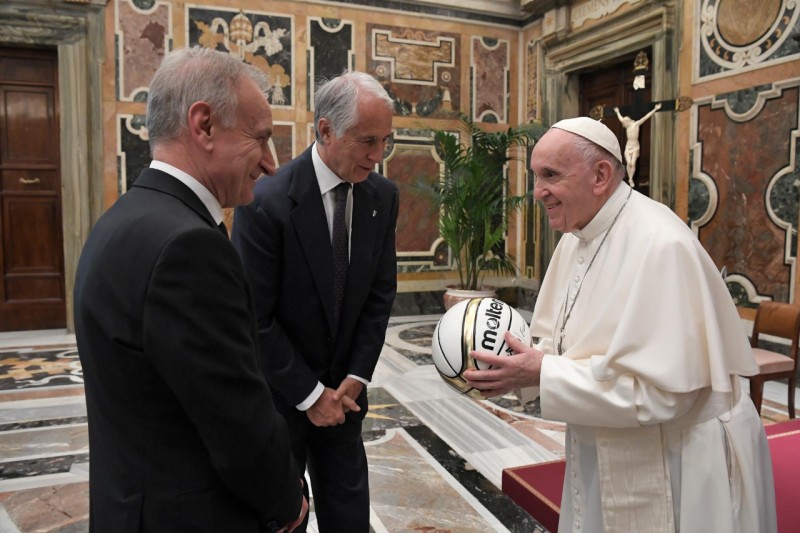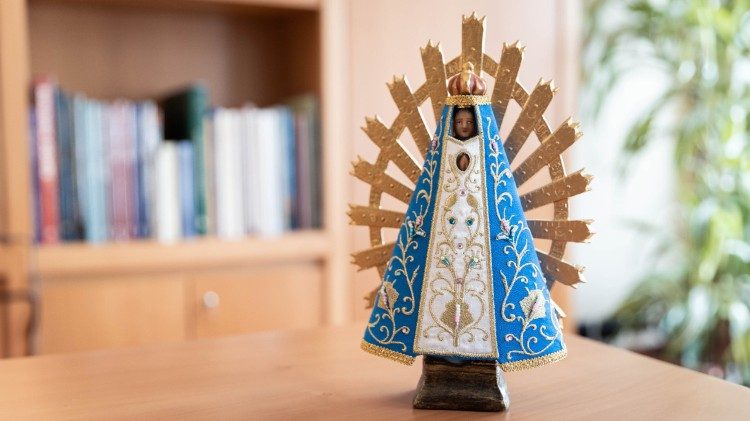Pope Praises Teamwork, Discipline of Basketball
Address to Italian Basketball Federation on 100th Anniversary

Pope Francis has high regard for the teamwork and discipline of basketball.
Although the Holy Father is better known as a fan of soccer, on May 31, 2021, he received a delegation from the Italian Basketball Federation, which is celebrating its 100th anniversary this year.
The Pope noted two characteristics of sporting activity:
- “The first is teamwork. There are some sports that are ‘individual’; however, sport always helps to bring people into contact with each other, to create relationships even between different people, often unknown to each other, who despite coming from different backgrounds come together and fight for a common goal. “
- “A second aspect, a sportsmanlike attitude, is discipline. Many young people and adults who are passionate about sport and follow you, cheering you on, often cannot imagine how much work and training goes into a competition.”
Pope Francis also pointed out that participation in sports can improve sportsmanship and the ability to accept defeat with grace and maturity.
Today’s encounter wasn’t the first for Francis and basketball. Last November he met with a small group of National Basketball Association (NBA) players from the United States to discussed their social justice activities.
And on a more playful note, at a general audience in 2015, Pope Francis met several players from the Harlem Globetrotters, who gave him a lesson on how to spin a basketball on his finger.
Here is the Pope’s full address to the Italian Basketball Federation:
Brothers and sisters, good morning!
I welcome you with joy. I share with you the celebration of the hundredth anniversary of the birth of the Italian Basketball Federation. I thank President Giovanni Petrucci for his words of greeting, and I also thank his successor. In the memory of your history, the memory of a game played in 1955 in Saint Peter’s Square in front of Pope Pius XII is still vivid; and also in the years that followed, the relationship between the Church and the world of sport has always been cultivated in the awareness that both, in different ways, serve the integral growth of the person and can offer a valuable contribution to our society.
I would like to emphasize two important aspects of sporting activity. I always repeat myself on this… Perhaps I should add a third, I’ll see.
The first is teamwork. There are some sports that are “individual”; however, sport always helps to bring people into contact with each other, to create relationships even between different people, often unknown to each other, who despite coming from different backgrounds come together and fight for a common goal. These are two important things: being united and having a goal. In this sense, sport is a medicine for the individualism of our societies, which often generates an isolated and sad self, making us incapable of “playing as a team” and cultivating a passion for a good ideal. Thus, through your commitment to sport, you remind us of the value of fraternity, which is also at the heart of the Gospel.
A second aspect, a sportsmanlike attitude, is discipline. Many young people and adults who are passionate about sport and follow you, cheering you on, often cannot imagine how much work and training goes into a competition. And this requires a lot of discipline, not only physical but also inner discipline: physical exercise, constancy, attention to an orderly life in terms of schedules and diet, rest alternating with training fatigue. This discipline is a school of training and education, especially for children and young people. It helps them to understand how important it is – and forgive me for quoting Saint Ignatius of Loyola – to learn to “put one’s life in order”. This discipline is not intended to make us rigid, but to make us responsible: for ourselves, for the things entrusted to us, for others, for life in general. It also helps the spiritual life, which cannot be left to the emotions alone, nor can it be lived in alternating phases, “just when I feel like it”. The spiritual life also needs an inner discipline made up of fidelity, constancy, and a daily commitment to prayer. Without constant inner training, faith runs the risk of fading away.
I would like to say one thing with basketball in mind. Yours is a sport that lifts you up to the heavens because, as a famous former player once said, it is a sport that looks upwards, towards the basket, and so it is a real challenge for all those who are used to living with their eyes always on the ground. I would also like this to be a noble task for you: to promote healthy play among children and young people, to help young people to look up, to never give up, to discover that though life is a journey made up of defeats and victories, the important thing is not to lose the desire to “play the game”. And to help them understand that when in life you don’t “shoot a hoop”, you haven’t lost forever. You can always get back on the court, you can still team up with others, and you can take another shot.
And here I would like to underline the attitude in the face of defeat. They told me one of these days – I don’t know where – there was a winner and one who came second, who didn’t make it. And the one who came second kissed the medal. Usually, when we come second, we have a long face, we are sad, and I wouldn’t say we throw the medal away but we feel like doing it. And this person kissed the medal. This teaches us that even in defeat, there is victory. To take on defeats with maturity, because it helps you grow, it lets you understand that in life not everything is always sweet, not everything is about winning. At times we have this experience of defeat. And when a sportsman, a sportswoman, knows how to “win defeat” in this way, with dignity, with humanity, with a big heart, this is a true honor, a true human victory.
I thank you and bless you from the bottom of my heart. Please, I ask you to pray for me! Thank you.
© Libreria Editrice Vatican
Related

Pope Francis Gifts a Statue of Our Lady of Luján to Gemelli and the Catholic University of the Sacred Heart
Exaudi Staff
25 April, 2025
2 min

Francis’s Tomb: A Legacy of Humility and Closeness
Exaudi Staff
25 April, 2025
4 min

The Family: A School of Love, Forgiveness, and Hope
Laetare
25 April, 2025
3 min

His Hope Does Not Die!
Mario J. Paredes
24 April, 2025
6 min
 (EN)
(EN)
 (ES)
(ES)
 (IT)
(IT)

